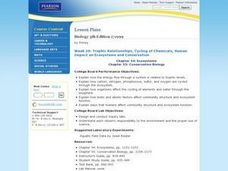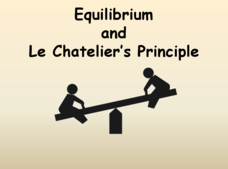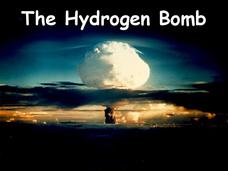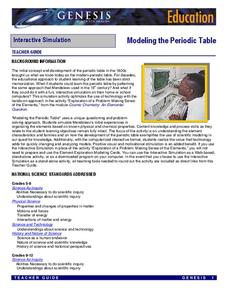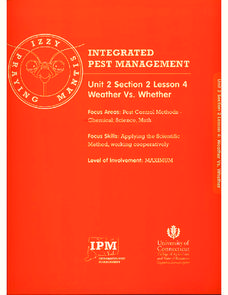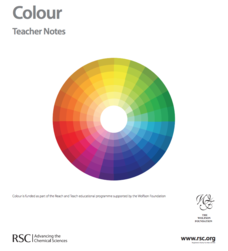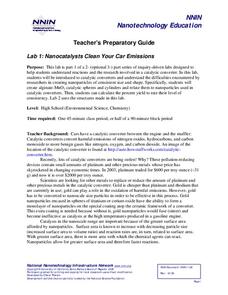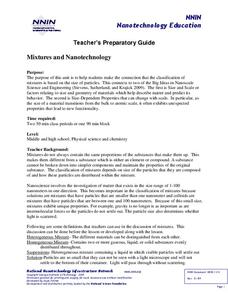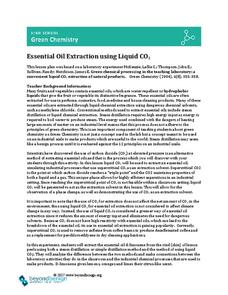Curated OER
Trophic Relationships, Cycling of Chemicals, Human Impact on Ecosystems and Conservation
Learners explore how the energy flow through a system is related to trophic levels. They investigate how organisms affect the cycling of elements and water through the biosphere. Students participate in lab activities to observe ways...
Science Geek
Equilibrium and Le Chatelier's Principle
Time to shake up the status quo with a presentation that describes Le Chatlier's Principle and has pupils examine situations in which equilibrium is upset. Four examples show different stresses to the reaction and the resulting shift.
It's About Time
Exploring Energy Resource Concepts
Please turn off the lights to conserve energy. Or not, after all energy is always conserved. This first lesson in an eight-part series includes three parts. Part A contains one hands-on activity and two inquiry-based experiments on heat...
Beyond Benign
Packed Up Properties
Determine physical properties of potential packaging materials. Continuing from previous lessons in the series, the resource asks groups to identify physical properties of the substances. They test for conductivity, solubility, water...
Serendip
Food, Energy and Body Weight
High schoolers learn why humans need calories, how they control weight with food choices, and the impact of exercise on energy. Scholars then apply their understanding to a case study of lunch choices and exercise.
Serendip
Photosynthesis and Cellular Respiration
How does energy from the sun make plants grow? Scholars move step by step through the processes that promote plant propagation during a detailed lesson. The resource illustrates ADP production and hydrolysis, then allows learners to...
Science Geek
The Hydrogen Bomb
Recycled Russian nuclear weapons provide 10 percent of the nuclear energy that the United States uses. The short presentation discusses the Teller-Ulam device. It provides a diagram of the parts as well as a description of the four...
Curated OER
The Thermite Reaction
Searching for a way to take your chemistry class to the next level? Provide pupils with an exciting and educational experiment demonstrating the thermite reaction! The mixture of aluminum powder and iron oxide allows young chemists to...
Teach Engineering
Engineering Brainstorming
Here is a instructional activity that offers a great hybrid of forming new skills and using current knowledge to come up with a plan. The class brainstorms information they would need to know or already know about hybrid vehicles. They...
Cornell University
Alka-Seltzer Rockets
Blast off! An engaging hands-on activity has pupils create rockets powered by Alka-Seltzer. They learn about the physics behind these rockets throughout the process.
Next Generation Science Storylines
Why Do Some Things Get Colder (or Hotter) When They React?
Some reactions absorb heat while others release it. Young scholars investigate both types of reactions in a 12-lesson unit. Each lesson presents a lab investigation that monitors temperature and considers the types of reactions taking...
NASA
Modeling the Periodic Table
Imagine a race to complete a puzzle where each person has the same 50 pieces, knows they are missing other pieces, and must figure out how everything fits together. The winner gets fame, listed in books for years to come, and a financial...
Chicago Botanic Garden
Calculating Your Ecological Footprint
You can lower your ecological footprint by recycling! Lesson four in this series of five has individuals, through the use of a computer, calculate their ecological footprints. Through discussions and analysis they determine how many...
San Francisco Public Utilities Commission
Pesky Plastics: The Problem with Plastic
What can happen to the environment if plastic continues to pollute it? Learners read about the implications of plastic on health, water, and nature in a two-page reading passage. After they finish reading, they work on six comprehension...
Nuffield Foundation
Investigating the Effect of Concentration of Blackcurrant Squash on Osmosis in Chipped Potatoes
Model and explore osmosis using squash and potatoes. Young scientists expose chunks of potatoes to different concentrations of a squash solution. They compare the weights of the chunks before and after exposure to the solution and use...
University of Connecticut
Weather Vs. Whether
Monarch butterfly populations have decreased by 90 percent over the past 20 years due to misuse and ineffectiveness of some pesticides. Given the challenge to increase pesticide safety and effectiveness, the class, through discussion,...
Science Geek
Electrochemistry
Introduce redox reactions including how to identify and solve them. After reviewing the rules for assigning oxidation numbers, a presentation presents trends and vocabulary. Finally, it explains voltaic cells, electrolytic cells,...
Royal Society of Chemistry
Colour—Gifted and Talented Chemistry
Add a splash of color to your chemistry class! Science scholars discover the principles behind color through a wide variety of hands-on activities. Lessons include dyes, chromatography, and flame tests.
Science 4 Inquiry
Introducing the Types of Energy
Young scientists explore many different types of energy including light, heat, nuclear, sound, potential, and more. They match the types of energy and identify when energy transfers from one type to another.
National Nanotechnology Infrastructure Network
Lab 1: Nanocatalysts Clean Your Car Emissions
What a big job for such a small particle. Young scientists learn about the role of nanoparticles in catalytic converters for cars. They conduct an experiment to create alginate-MnO2 catalytic spheres.
National Nanotechnology Infrastructure Network
Mixtures and Nanotechnology
What does size have to do with it? Learners analyze different mixtures, both homogeneous and heterogeneous, to discover the properties related to the size of their particles. The activity connects these properties to those of...
Physics Classroom
Work
Current work lesson plan just not ... working? Add an engaging interactive that helps pupils explore positive and negative work relationships! Individuals assess situations to determine what type of work, if any, the resource describes....
Curated OER
Acids and Alkalis
This PowerPoint progresses slide-by-slide through all the facts you would want to deliver about acids, alkalis, salts, and the related lab tests. Each slide has one or two facts about a physical or chemical property or behavior. The...
Beyond Benign
Essential Oil Extraction Using Liquid CO2
When life hands you lemons ... experiment on them! Green chemistry gurus compare extraction methods for essential oils through a lab activity. Lab groups use traditional distillation and liquid carbon dioxide extraction methods, then...
Other popular searches
- Physical and Chemical Changes
- Chemical Changes in Matter
- Physical Chemical Changes
- Chemical Changes in Rocks
- Chemical Changes Rust
- Matter Chemical Changes
- Chemical Changes Indicators
- What Are Chemical Changes
- Rates of Chemical Changes
- Chemical Changes Rusting
- Chemical Changes of Matter
- Physical/chemical Changes


